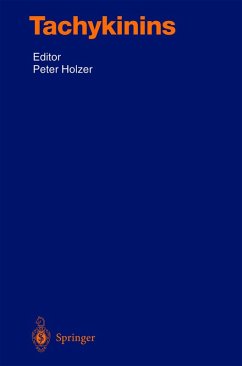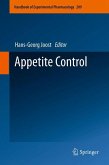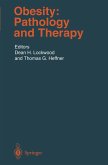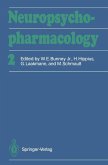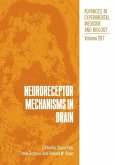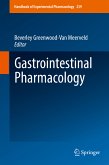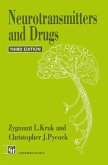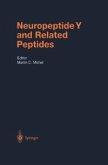Tachykinins (eBook, PDF)
Redaktion: Holzer, Peter
233,95 €
233,95 €
inkl. MwSt.
Sofort per Download lieferbar

117 °P sammeln
233,95 €
Als Download kaufen

233,95 €
inkl. MwSt.
Sofort per Download lieferbar

117 °P sammeln
Jetzt verschenken
Alle Infos zum eBook verschenken
233,95 €
inkl. MwSt.
Sofort per Download lieferbar
Alle Infos zum eBook verschenken

117 °P sammeln
Tachykinins (eBook, PDF)
Redaktion: Holzer, Peter
- Format: PDF
- Merkliste
- Auf die Merkliste
- Bewerten Bewerten
- Teilen
- Produkt teilen
- Produkterinnerung
- Produkterinnerung

Bitte loggen Sie sich zunächst in Ihr Kundenkonto ein oder registrieren Sie sich bei
bücher.de, um das eBook-Abo tolino select nutzen zu können.
Hier können Sie sich einloggen
Hier können Sie sich einloggen
Sie sind bereits eingeloggt. Klicken Sie auf 2. tolino select Abo, um fortzufahren.

Bitte loggen Sie sich zunächst in Ihr Kundenkonto ein oder registrieren Sie sich bei bücher.de, um das eBook-Abo tolino select nutzen zu können.
- Geräte: PC
- ohne Kopierschutz
- eBook Hilfe
- Größe: 66.11MB
Andere Kunden interessierten sich auch für
![Appetite Control (eBook, PDF) Appetite Control (eBook, PDF)]() Appetite Control (eBook, PDF)233,95 €
Appetite Control (eBook, PDF)233,95 €![Obesity: Pathology and Therapy (eBook, PDF) Obesity: Pathology and Therapy (eBook, PDF)]() Obesity: Pathology and Therapy (eBook, PDF)73,95 €
Obesity: Pathology and Therapy (eBook, PDF)73,95 €![Neuropsychopharmacology (eBook, PDF) Neuropsychopharmacology (eBook, PDF)]() Neuropsychopharmacology (eBook, PDF)73,95 €
Neuropsychopharmacology (eBook, PDF)73,95 €![Neuroreceptor Mechanisms in Brain (eBook, PDF) Neuroreceptor Mechanisms in Brain (eBook, PDF)]() Neuroreceptor Mechanisms in Brain (eBook, PDF)40,95 €
Neuroreceptor Mechanisms in Brain (eBook, PDF)40,95 €![Gastrointestinal Pharmacology (eBook, PDF) Gastrointestinal Pharmacology (eBook, PDF)]() Gastrointestinal Pharmacology (eBook, PDF)217,95 €
Gastrointestinal Pharmacology (eBook, PDF)217,95 €![Neurotransmitters and Drugs (eBook, PDF) Neurotransmitters and Drugs (eBook, PDF)]() Z. L. KrukNeurotransmitters and Drugs (eBook, PDF)40,95 €
Z. L. KrukNeurotransmitters and Drugs (eBook, PDF)40,95 €![Neuropeptide Y and Related Peptides (eBook, PDF) Neuropeptide Y and Related Peptides (eBook, PDF)]() Neuropeptide Y and Related Peptides (eBook, PDF)233,95 €
Neuropeptide Y and Related Peptides (eBook, PDF)233,95 €-
-
-
Produktdetails
- Verlag: Springer Berlin Heidelberg
- Seitenzahl: 569
- Erscheinungstermin: 6. Dezember 2012
- Englisch
- ISBN-13: 9783642188916
- Artikelnr.: 53101249
Dieser Download kann aus rechtlichen Gründen nur mit Rechnungsadresse in A, B, BG, CY, CZ, D, DK, EW, E, FIN, F, GR, HR, H, IRL, I, LT, L, LR, M, NL, PL, P, R, S, SLO, SK ausgeliefert werden.
- Herstellerkennzeichnung Die Herstellerinformationen sind derzeit nicht verfügbar.
Peter Holzer obtained his Ph.D. in Physiology and Biochemistry from the University of Graz, Austria, in 1978. His academic career included a postdoctoral fellowship at the A.R.C. Institute of Animal Physiology and the M.R.C. Neurochemical Pharmacology Unit at the University of Cambridge, U.K., in 1980. After becoming Reader in Neuropharmacology at the University of Graz in 1985, he was a visiting scientist with the CURE Digestive Diseases Research Center at the University of California Medical School in Los Angeles, U.S.A., in 1989. In 1993 he was promoted to Professor of Neuropharmacology in the Department of Experimental and Clinical Pharmacology at the University of Graz, Austria. In 2000 Dr. Holzer declined to take the chair of Pharmacology and Toxicology at the Department of Pharmacy of the University of Innsbruck, Austria. Dr. Holzer has been holding grants from the Austrian Science Foundation, the Austrian National Bank, the Federal Ministry of Education, Science and Culture of the Republic of Austria and the Zukunftsfonds of the Province of Styria, Austria. His major research interests are in the fields of neuropharmacology, gastrointestinal pharmacology and experimental neurogastroenterology. Particular topics of research include the function of enteric neurons and primary afferent neurons in health and disease, the implication of neuropeptides and neuropeptide receptors in the regulation of gastrointestinal motility, inflammation and ulceration and the development and pharmacological characterization of experimental models with which to study dyspepsia and visceral pain. Dr. Holzer¿s publications include more than 170 papers in peer-reviewed international journals. Dr. Holzer has been Chairman of the European Neuropeptide Club 1994 - 1996, Secretary of the IUPHAR Section of Gastrointestinal Pharmacology 1994 - 1998, and President of the Austrian Neuroscience Association 2002 - 2003. Dr. Holzer has been serving onthe editorial boards of several premier journals in his field, including Neuroscience, British Journal of Pharmacology, Neurogastroenterology & Motility, Naunyn-Schmiedeberg's Archives of Pharmacology, Regulatory Peptides and Digestion.
History of a Pioneering Neuropeptide: Substance P.- The Tachykinin Peptide Family, with Particular Emphasis on Mammalian Tachykinins and Tachykinin Receptor Agonists.- The Histochemistry of Tachykinin Systems in the Brain.- The Nomenclature of Tachykinin Receptors.- The Mechanism and Function of Agonist-Induced Trafficking of Tachykinin Receptors.- Tachykinin NK1 Receptor Antagonists.- Tachykinin NK2 Receptor Antagonists.- Tachykinin NK3 Receptor Antagonists.- Combined Tachykinin NK1, NK2, and NK3 Receptor Antagonists.- Pre-protachykinin and Tachykinin Receptor Knockout Mice.- Therapeutic Potential of Tachykinin Receptor Antagonists in Depression and Anxiety Disorders.- The Role of Tachykinins and the Tachykinin NK1 Receptor in Nausea and Emesis.- Substance P (NK1 Receptor Antagonists-Analgesics or Not?.- Role of Tachykinins in Neurogenic Inflammation of the Skin and Other External Surfaces.- Role of Tachykinins in Obstructive Airway Disease.- Role of Tachykinins in the Gastrointestinal Tract.
History of a Pioneering Neuropeptide: Substance P.- The Tachykinin Peptide Family, with Particular Emphasis on Mammalian Tachykinins and Tachykinin Receptor Agonists.- The Histochemistry of Tachykinin Systems in the Brain.- The Nomenclature of Tachykinin Receptors.- The Mechanism and Function of Agonist-Induced Trafficking of Tachykinin Receptors.- Tachykinin NK1 Receptor Antagonists.- Tachykinin NK2 Receptor Antagonists.- Tachykinin NK3 Receptor Antagonists.- Combined Tachykinin NK1, NK2, and NK3 Receptor Antagonists.- Pre-protachykinin and Tachykinin Receptor Knockout Mice.- Therapeutic Potential of Tachykinin Receptor Antagonists in Depression and Anxiety Disorders.- The Role of Tachykinins and the Tachykinin NK1 Receptor in Nausea and Emesis.- Substance P (NK1 Receptor Antagonists-Analgesics or Not?.- Role of Tachykinins in Neurogenic Inflammation of the Skin and Other External Surfaces.- Role of Tachykinins in Obstructive Airway Disease.- Role of Tachykinins in the Gastrointestinal Tract.
